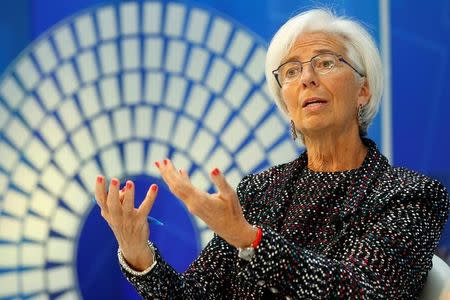IMF chief proposes visit to Congo amid economic slump

By Aaron Ross KINSHASA (Reuters) - International Monetary Fund Managing Director Christine Lagarde has written to Democratic Republic of Congo President Joseph Kabila to propose a visit from IMF officials amid a deepening economic crisis, the finance minister said on Thursday. The rare move by the IMF's top official to outline such a proposal directly to a head of state underscores concerns about rapid currency depreciation, low foreign reserves, violent political upheaval and a dire need for cash. The franc has lost half its value since last year due to low oil and mineral prices, and inflation jumped from under 2 percent in 2015 to over 25 percent last year. While the government expects higher commodity prices to boost GDP growth from 2.5 percent last year to 4.9 percent this year, the IMF predicts 2.8 percent growth. The IMF visit could help Africa's top copper producer attract donors who have been put off in recent years by a tense political climate and reports of human rights violations. Finance minister Henri Yav said he discussed the letter at length with IMF officials during a visit to Washington last month, but that Congo had been waiting for the formation of a new government on Tuesday before responding. "The letter was received ... The visit will take place," he said, adding that the government will respond in the next few days. Yav declined to elaborate on the contents of the letter. The IMF's representative in Congo declined to comment. An IMF delegation last visited Congo in June 2016 as the government petitioned bilateral and multilateral donors for financial assistance. Those overtures failed, and investment has slumped largely due to political uncertainty and criticisms of the government's human rights record. Dozens died last year in violent protests as Kabila refused to step down when his mandate expired. Worsening militia violence has raised fears of a backslide toward the civil wars of the turn of the century that killed millions. The IMF said in March that it was "prepared to provide financial support once the political situation is clarified and stabilised". The installation of a transitional government this week was expected to open the door to increased assistance but major donors, including France and Belgium, criticised Kabila's decision to appoint Bruno Tshibala as prime minister last month, saying it violated a December deal with opponents. The agreement, which requires that an election to succeed Kabila take place this year, called for the prime minister to be nominated by the country's main opposition bloc but Kabila ultimately chose a member of a dissident wing of the opposition. (Reporting By Aaron Ross; Editing by Edward McAllister and Pritha Sarkar)
